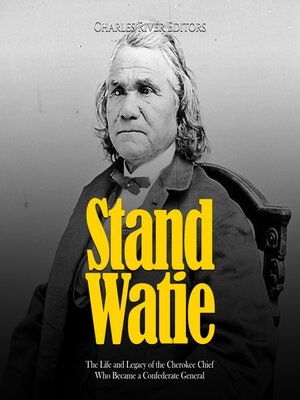Stand Watie
audiobook (Unabridged) ∣ The Life and Legacy of the Cherokee Chief Who Became a Confederate General
By Charles River Editors

Sign up to save your library
With an OverDrive account, you can save your favorite libraries for at-a-glance information about availability. Find out more about OverDrive accounts.
Find this title in Libby, the library reading app by OverDrive.



Search for a digital library with this title
Title found at these libraries:
| Library Name | Distance |
|---|---|
| Loading... |
Stand Watie's life connects the traditional Cherokee homeland in Tennessee and Georgia, the fight within the tribe over leaving for the West or staying on their homeland and trying to resist, and the Trail of Tears. At the same time, his life also includes the ongoing split between mixed-blood and full-blood Cherokee in the Cherokee Nation, and the chaos of Indian Territory during the Civil War.
On the surface, Indian Territory was peaceful and fairly prosperous, but old resentments simmered under the surface. The most dangerous of these was in the Cherokee Nation. Following the Cherokee removal, the leaders of the faction of the tribe that had actually signed the Treaty of New Echota suffered violence. There had been a law that giving away Cherokee land was punishable by death, and several of the leaders who signed the treaty were murdered. Stand Watie was one of the signers, and he barely escaped, but one of his brothers was executed.
The Principal Chief was John Ross. He and his faction managed to retain political control of the Cherokee tribe, but there was lasting enmity between the Watie and Ross factions of the tribe. In a broad sense, the signers of the hated treaty were mixed-blood Cherokee, and the resistance had been led by full-bloods. Stand Watie headed the mixed-blood faction and John Ross the full-blood faction. Ironically, John Ross himself was mixed-blood and Watie was a full-blood, but regardless, this tribal split had important ramifications for the Cherokee in the coming war.
Like the country as a whole, the Cherokee Nation was split over the question of slavery, and with an estimated 100 slaves owned, Watie was the biggest native slaveholder in the region. At the start of the war, Watie was commissioned as a colonel in Confederate service and later as a brigadier general. His 1st Cherokee Mounted Rifles Regiment fought more engagements than any other Confederate unit west of the Mississippi River.







